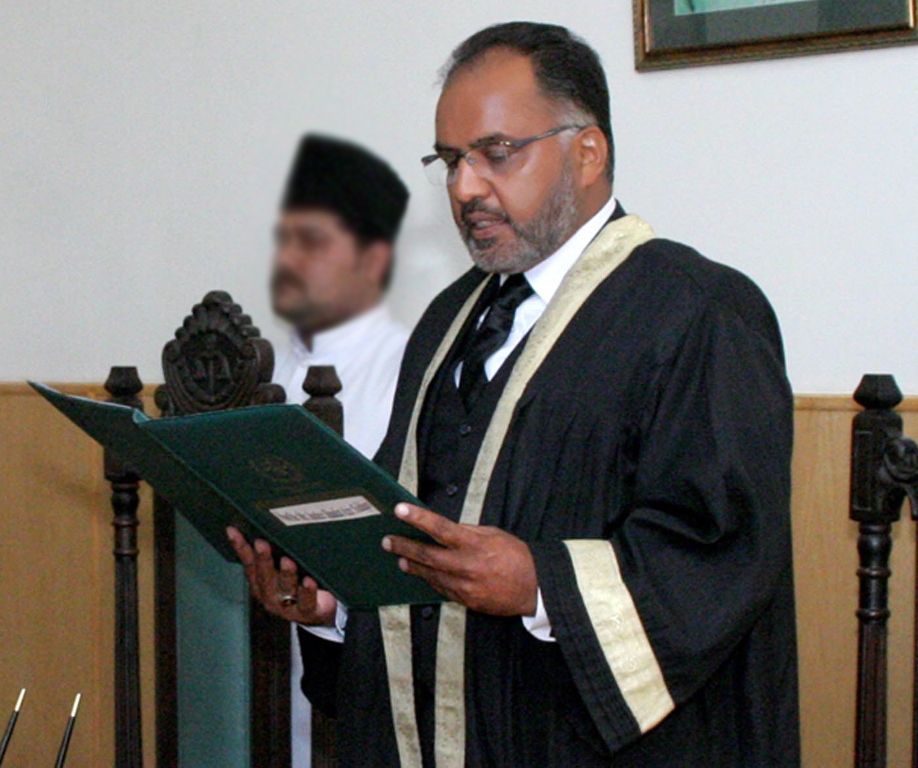
The two-judge bench of the apex court, comprising Justice Azmat Saeed Sheikh and Justice Qazi Faez Isa, also referred the matter to Chief Justice Mian Saqib Nisar to consider forming a larger bench for hearing Justice Shaukat Aziz Siddiqui’s petition because it was pointed out that all the three SC judges on the special bench formed by the chief justice to hear the case were part of the SJC.
On May 18, the SJC had dismissed the plea by Justice Siddiqui for an open trial in a case of misconduct. The council is scheduled to resume hearing of the case on November 7 to record evidence against him.
SC to take up serving IHC judge case today
The Supreme Court bench has nonetheless recommended that the constitutional petition be fixed for an early hearing.
Legal experts believe that in view of the November 2 order, the council may stop proceedings till a final decision on the constitutional petition by the IHC judge.
But the IHC judge’s 14-page constitutional petition requested the Supreme Court to declare SJC’s May 18 order null and void, arguing that it was passed without lawful authority.
On Thursday, senior lawyer Makhdoom Ali Khan argued for about 30 minutes before the SC bench on behalf of the IHC judge. The counsel presented several reasons in favour of an open hearing of the trial at the council.
He said that the SJC hearing should be held in public because an in-camera trial might lead to speculative reports in the media.
The bench also observed that the council had initiated proceedings against one Lahore High Court judge for allegedly misbehaving with a police official, but media reports said he was charged over corruption.
The lawyer argued that if a witness was coming to record a statement against his client, he should appear before an open court so that his conduct could also be judged by the public.
Challenging the SJC Procedure of Inquiry 2005, he said: “The council has no authority to frame rules under Article 209 of the Constitution,” adding, “The IHC judge has a fundamental right to insist that an inquiry into his conduct be conducted publicly.”
After noting all contentions of the counsel, the bench issued notices to the respondents, including the SJC, the federation and the AGP.
Earlier, the IHC judge in his petition stated that he had nothing to hide and his dignity was not compromised if the proceedings were held in-camera.
The petition also states that due process requires that a person must be given reasonable opportunity to defend himself, something not guaranteed in a secret trial. “There is no greater protection than free speech and free press for the independence of constitutional institutions,” it is further submitted.
The petition contends that in-camera proceedings are violative of Articles 8, 18 and 25 of the Constitution.
“Under Article 210 (2) of the Constitution, the provisions of Article 204 [contempt of court] are applicable to the proceedings before the SJC. This gives its powers akin to those of a high court or indeed the Supreme Court.
“The status of the SJC is thus similar to that of a constitutional court. It is indeed an institution created by the Constitution. Anybody vested [with] the powers to punish for contempt is for all practical purposes a body which determines the right and liabilities and has duty to act fairly.”
The petition contends that public hearing will be of advantage to witnesses from perjuring themselves. It argues that the no appeal or revision lies against the SJC’s final report, adding a judge adversely affected is left without remedy.
“The president has no effective role in this matter. He can neither sit in appeal over the adverse report. The entire career, reputation and future of the judge depend on the report.”
Likewise, the petition states that the SJC proceedings are in nature a quasi criminal trial.
“If a judge is removed from his office, he is stripped of office and deprived of his pensionary rights and other benefits. It cannot, therefore, be said that the proceedings before the SJC have no bearing on the rights of the petitioner,” says the petition.
On the other hand, the AGP office is opposing open trial of judges.

1725030039-0/Untitled-design-(2)1725030039-0-165x106.webp)
1725366721-0/kyle-(1)1725366721-0-165x106.webp)
1731410017-0/BeFunky-collage-(45)1731410017-0-165x106.webp)


1732696613-0/BeFunk_§_]__-(59)1732696613-0.jpg)
1732622842-0/Express-Tribune-(9)1732622842-0-270x192.webp)


1732701958-0/BeFunk_§_]__-(61)1732701958-0.jpg)






COMMENTS
Comments are moderated and generally will be posted if they are on-topic and not abusive.
For more information, please see our Comments FAQ